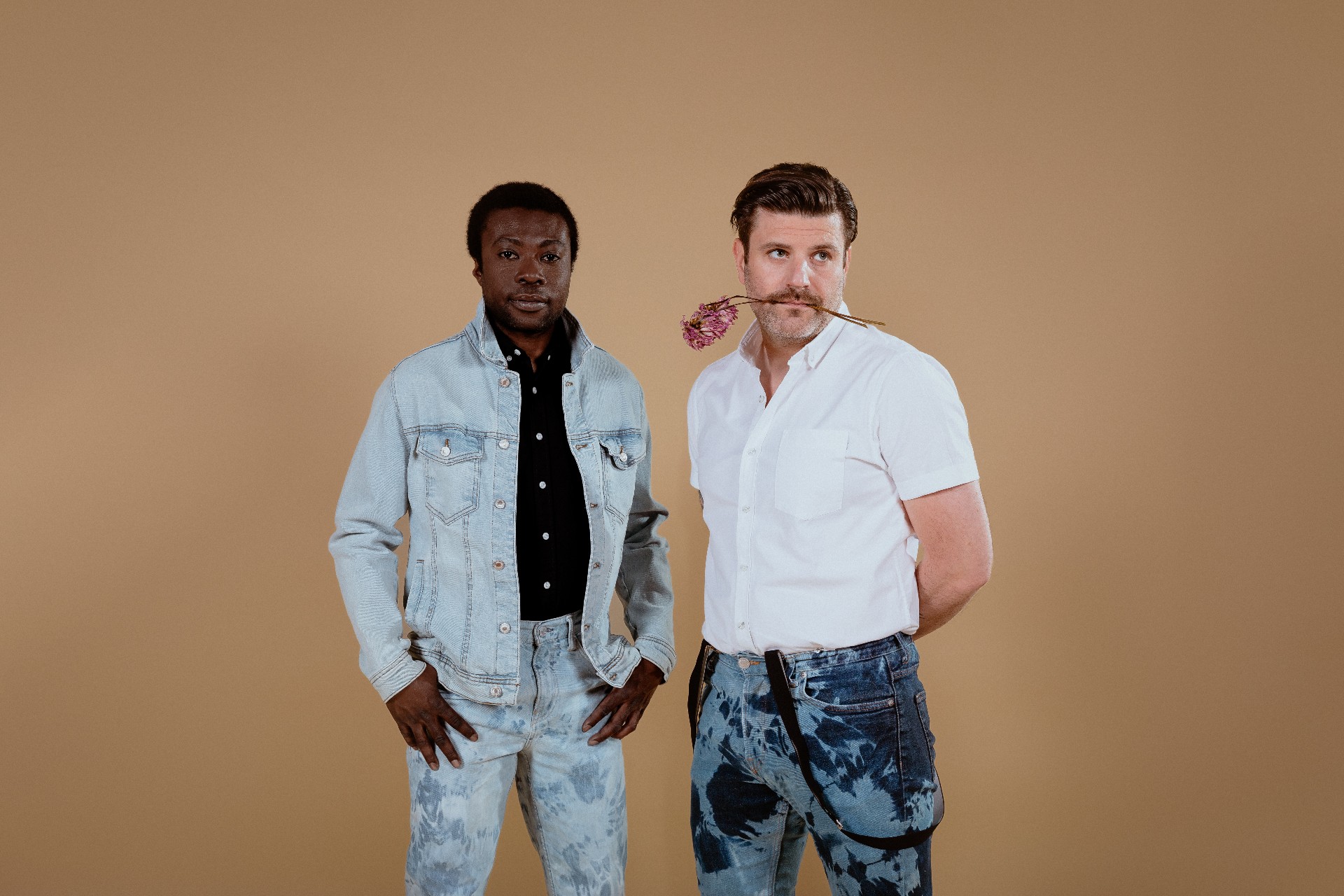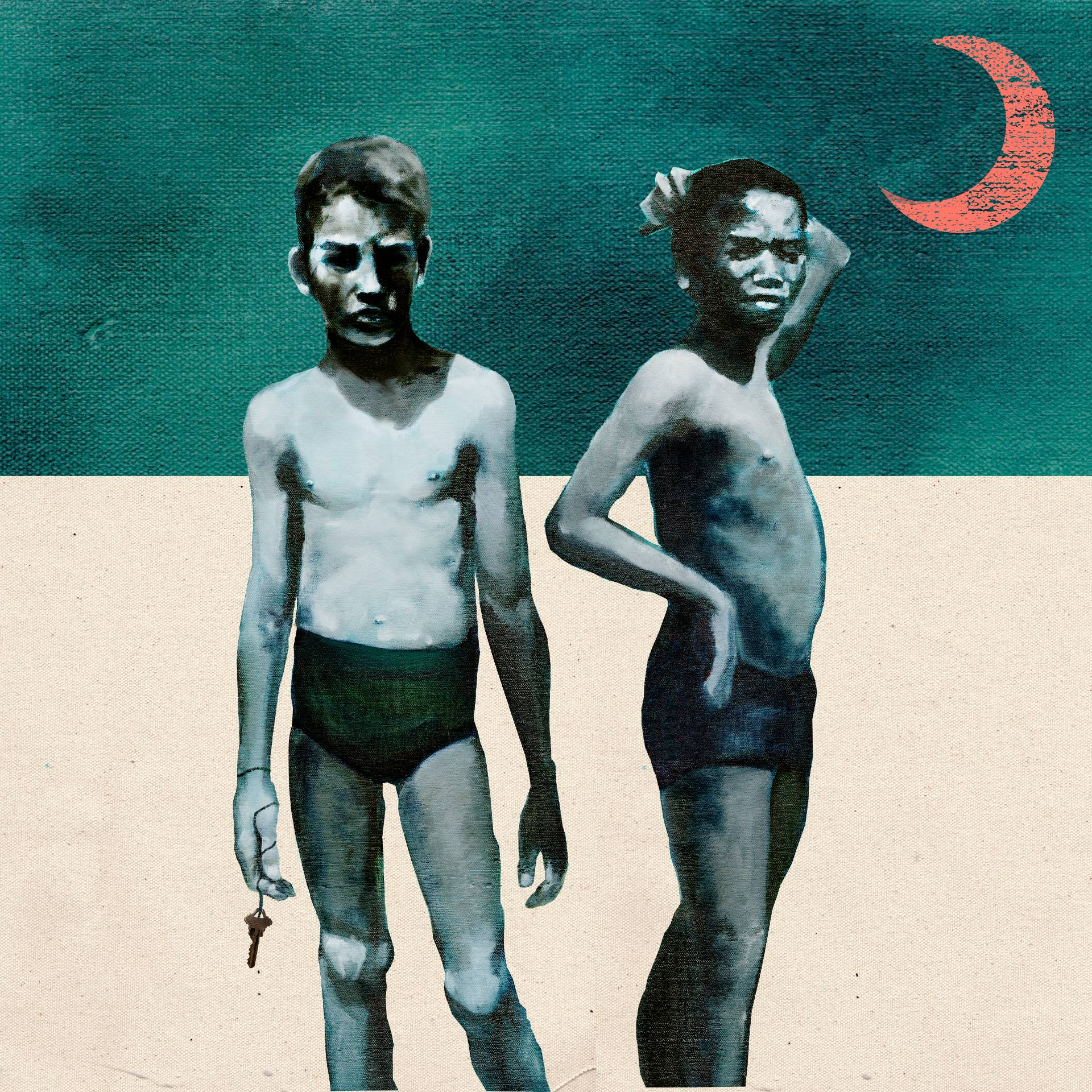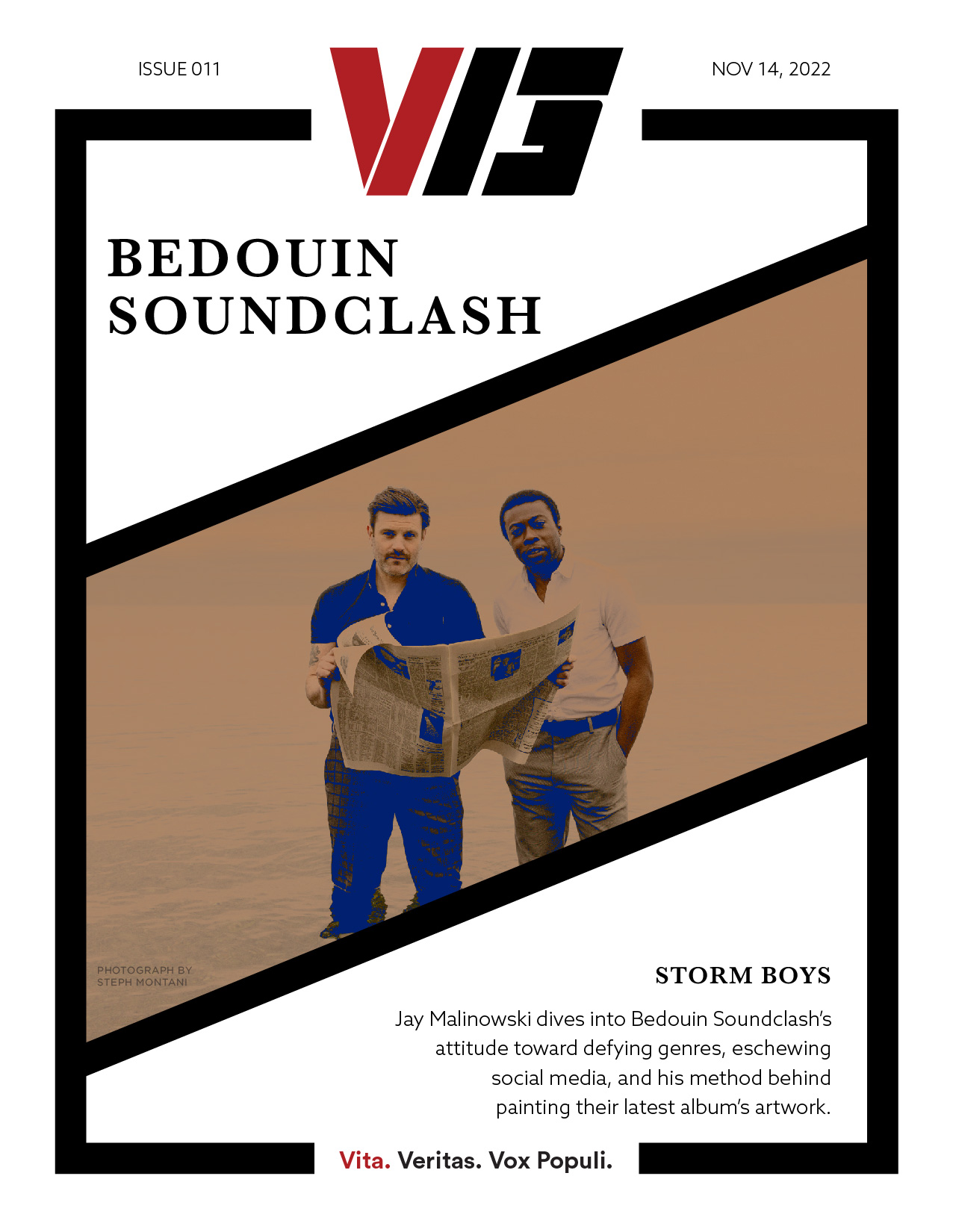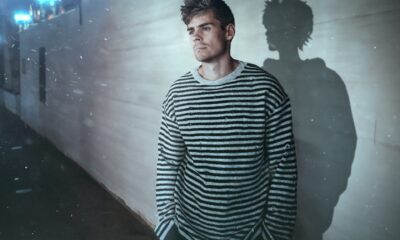

Alternative/Rock
Bedouin Soundclash: “When you get to a certain age, some kind of hurricane happens in your life: and that’s where you’ll meet yourself”
Jay Malinowski dives into Bedouin Soundclash’s attitude toward defying genres, eschewing social media, and his method behind painting their latest album’s artwork.
Listening to Bedouin Soundclash’s Sounding a Mosaic, my wife singing along word for word, I remembered the world we’d inhabited nearly two decades ago. I was transported back to Kensington Market in the early 2000s when MySpace and mini disc players were the signposts of musical fanaticism. By the time we moved on to Street Gospels, I remembered why I liked them in the first place: they sounded like the best parts of Bob Marley and The Police.
I wasn’t alone. Sounding of a Mosaic and Street Gospels went platinum and gold, respectively. They played Vans Warped Tour, toured with Coldplay and Alicia Keys, and shared the stage with the likes of Damian Marley and The Roots. Their songs were played seemingly everywhere, from radio to advertisements to television shows. Everywhere in Canada, their “colour outside the lines” mix of pop, punk, indie, reggae, worldbeat and folk ended up elevating them to the position of one of the most popular bands in Canadian music.
And then, after their fourth album, Light The Horizon, in 2010, the duo, comprised of Eon Sinclair and Jay Malinowski, dove into solo work and side projects. The group had unofficially begun their hiatus.
Seven years passed.
And then came the singles. They began in late 2017, lasting through the entirety of 2018, before reemerging with their fifth album, Mass, in late 2019. Their label puts it most succinctly in describing that effort, stating it was “recorded at Marigny Studio’s in New Orleans with the Preservation Hall Jazz Band, and in Vancouver at St. James Church with the children of the St. James Music Academy.”
“Our music gets described as ‘happy’ a lot and I don’t actually hear it as that, as super happy.”
To say that it was a new direction for the band is both true and false. It’s true that the New Orleans band and choral work added yet another layer to the group’s gumbo of genres. But they were always a hard-to-nail-down act. To that end, the band has yet another genre to add to the palette of musical influence to draw from: their latest LP, We Will Meet In A Hurricane (released October 21st via Dine Alone Records), is a lot dancier. I don.t mean Abba or Calvin Harris – instead, think Peter Gabriel or Talking Heads. Sitting down with Jay via Zoom, speaking with me from his home in Victoria, B.C., he agrees with that assessment.
“It’s a lot more simplified. You mentioned Street Gospels, and that’s when I would say we started a new chapter as a band… Just the general spirit of the band changed. And this is the first record coming back to that, kind of, more Street Gospels/Sounding A Mosaic era.”
But as vibrant as the new album feels and as sun-soaked as it may feel, it would be a mistake to simply categorize it as “happy music.’ “Our music gets described as ‘happy’ a lot, and I don’t actually hear it as that, as super happy. I guess if I listen to The Clash, like ‘White Man In Hammersmith Palais’ might sound happy, or ‘Rudie Can’t Fail’ might sound happy, but I don’t think it’s just ‘happy’ music. Same with Talking Heads. Same with Peter Gabriel.”
Speaking on the confines of genre, Jay becomes more muted, almost introspective, as if he’s about to share a secret that he’s not sure he should be telling. “In the past little while, we’ve gone into this really…I don’t want to call it a Dark Age, but it feels like everything has to be ‘You do this, and you people do this.’ And when you’re pushing beyond a limit, you’re very open to attack. And I don’t mean this just creatively; I mean this with all things in life. But that vulnerable place is where an artist should be. But it’s hard, and especially when society is telling you you can’t do something in a certain way.”
“And then in 2012, that’s when things really shifted… I was around people who were very successful in creating a career for themselves out of social media, and it definitely is a different mindset.“
But doing things a certain way was never the band’s forte. What they did, they did the way they liked to do it. And when that got stale, they baled. Their album, before taking their hiatus, was released at a time when the age of the hipster was reaching past its prime, social media had begun to fully take over the way that music was shared and released, and the way that people interacted was altered completely. When I point out that Bedouin Soundclash managed to take a break during the decade that social media and its constituent narcissistic elements took over the music industry, Jay laughs.
“I was talking to Justin Peroff [Broken Social Scene] about our bands, and he was talking about bands from 2002-2004, and he said ‘everyone’s doing indie, and then come you guys and, I’m not sure what you guys are doing – The Clash? The Police?’. And I put that in the realm of 2003-2012. And then in 2012 that’s when things really shifted… I was around people who were very successful in creating a career for themselves out of social media, and it definitely is a different mindset. And the people who thrived are very different from the people who thrived before.”
“You know what I didn’t have before when we were playing before in that 2007-2008 era: you start to take things for granted.“
With that shift came more sinister implications. The Brexit referendum and US Presidential election in 2016 were later revealed to have been heavily impacted by social media targeting. This would be echoed in various elections across countries, notably in Brazil, and continues to be a problem for the rise in partisanship noted within the United States.
“I feel like we have this model that all progress is progress. Do you know what I mean? And it’s not. As in, progress being attached to a good thing. And then there’s this insane idea that young people know better than old people… People who are older than me know a lot of things that I don’t. And social media really plays on that. It intensifies generational gaps, and coming together with the things you like in your own bubble. I mean, we all know it, we all know it’s tearing people apart.”
But with that emerging knowledge, comes hope. “I do think we’re coming out of it now. I think people are finally tired of it. It was exciting for a bit, like ‘hey look at the pictures I can take with so-and-so, or doing this thing or whatever’, but we’ve gone through every possible scenario and now it’s almost a joke of itself. When you look at people now, it’s them making fun of themselves for doing things on social media. So maybe this is, hopefully this is, the final death throe of it.”
“ I feel like we have this model that all progress is progress. Do you know what I mean? And it’s not.”
We pivot to talking about the artwork. I ask Jay about his painting that is now the album’s artwork.
“The subject of that painting, I called it ‘Hurricane Boys’. It’s supposed to be a kind of representation of me and Eon when we were younger. And it’s as boys when they’re just at the beginning of adolescence, just starting to become men. So they’re pretending to be older than they are, and developing the insecurities and whatever armour that they’ll wear throughout life.”
In their time away from the band, the two of them were able to reflect and grow. I can’t help but think that was instrumental in developing his take on the themes of vulnerability and passionate jubilance as he explains their presence on the album and its artwork.

Artwork for the single “Shine On” by Bedouin Soundclash
“So the idea about the album is how at some point you develop all these things – and it’s all people, not just boys – you develop these ways of being and modes of survival through trauma just to survive, mainly so that your ego can survive. And then when you get to a certain age, some kind of hurricane happens in your life, and that’s where you’ll meet yourself. And it’ll rip you apart, because that armour doesn’t actually help you get through life, it only gets you so far. It won’t take you to being fully realized. Not everyone does it. There are people who will go their entire lives and turn around and say, ‘this is not something I’m willing to confront’. And there’s a cost to that. There’s a cost to not dealing with yourself.”
“With the painting, what I wanted to show was that confidence and that feeling of invincibility but also the clear vulnerability of these two boys, and this storm that’s coming at them. Their nakedness in the face of these natural forces which are way more powerful than them. And the moon for me is supposed to be this cycle of realization… Usually my paintings aren’t super symbolic like that, but when it comes to an album cover you get to have fun because everything does mean something. And so the focus for me was more on the subject of these two boys being at the beginning of this journey.”
I ask him if he still feels like they are a couple of boys, in terms of music. “We met when we were eighteen, and yeah I still do. You don’t want to lose that fire. And I think that’s the danger, you can lose that curiosity you have towards life when you live in fear. So with the band, that’s like the dream, right? Like, ‘what do you want to be when you grow up?’ ‘I want to pick up a guitar.’
“Now, there’s two things to that: one, there’s enough people in bands who are Peter Pans, and never grow up because it’s the opposite problem when you play in a band, right? Then you see people who don’t grow up, ‘cause you don’t have to. As opposed to the typical problem which is just ‘you need to grow up’. And you go out and do something that you don’t love.”
I point out to him that he picked a third way. “How’s that?” he asks. I point out that they put the band on hold to explore and grow, and then returned at a later date, to do what they love, but on their terms, in a way that still serves them. But Jay’s not convinced. “Maybe when you take a high-level view of someone’s life it can look like that, like the best of both worlds, but it’s the same with anyone who’s done this: the problems remain the same. One thing doesn’t make your life better. And that’s the age-old saying, right? Getting what you want doesn’t make you happy.”
“There are people who will go their entire lives and turn around and say, ‘this is not something I’m willing to confront’. And there’s a cost to that. There’s a cost to not dealing with yourself.”
I ask him about the time in between, and we talk a bit about his time with various solo projects. Notable among these is a project that wasn’t even music, but instead his novella Skulls & Bones that he wrote and illustrated. As he explains how much harder it is to write than it is to make music, I can’t help but nod, almost grateful. Reading Skulls & Bones, I was taken aback by how well written it was. As a writer, I’m grateful to hear him talking about how hard it ended up being.
“I got the idea for that book when I was walking through Spain… I thought that book was going to take three months. It ended up taking me two years.”

Artwork for the album ‘We Will Meet in a Hurricane’ by Bedouin Soundclash
I ask him about whether the experiences, side projects and overall time away gave him any further insight into playing in the band now as opposed to earlier in his career.
“I am super grateful. You know what I didn’t have before when we were playing before in that 2007-2008 era: you start to take things for granted. And you start to think, ‘ugh this is a drag, doing this and that’, and people kept saying, ‘you should be so grateful’. And that actually made me feel so much worse, like ‘I don’t even feel grateful’. That would make me angry. Now, being 40, when we go to interior B.C. and there’s a mom with her children singing along to ‘12:59 Lullaby’, there’s no place I’d rather be, you know?”
I believe him as he looks off into the distance, presumably at the frustratingly beautiful view that only B.C. can afford. He’s reflective, almost wistful, as he considers his words.
“And that’s what’s changed, is a feeling of complete gratitude. And full knowledge that this isn’t something that usually happens. Like, wow, how grateful that that happened that I made some songs that resonated with you.”
Then he looks back at me, smiling, and grabs his coffee mug. “Like maybe when you’re younger you think, ‘yeah, yeah, yeah – like I said I was going to play in a band and I do play in a band. And it just happened because it’s supposed to happen.’ And it’s like, no it’s not. To me that’s insane.” He laughs, taking a swig of coffee.
I think of a couple of kids, ready to take on the world, and smile.
-

 Music1 week ago
Music1 week agoTake That (w/ Olly Murs) Kick Off Four-Night Leeds Stint with Hit-Laden Spectacular [Photos]
-

 Alternative/Rock2 days ago
Alternative/Rock2 days agoThe V13 Fix #011 w/ Microwave, Full Of Hell, Cold Years and more
-

 Alternative/Rock1 week ago
Alternative/Rock1 week agoThe V13 Fix #010 w/ High on Fire, NOFX, My Dying Bride and more
-

 Features1 week ago
Features1 week agoTour Diary: Gen & The Degenerates Party Their Way Across America
-

 Culture2 weeks ago
Culture2 weeks agoDan Carter & George Miller Chat Foodinati Live, Heavy Metal Charities and Pre-Gig Meals
-

 Music1 week ago
Music1 week agoReclusive Producer Stumbleine Premieres Beat-Driven New Single “Cinderhaze”
-

 Indie2 days ago
Indie2 days agoDeadset Premiere Music Video for Addiction-Inspired “Heavy Eyes” Single
-

 Alternative/Rock2 weeks ago
Alternative/Rock2 weeks agoThree Lefts and a Right Premiere Their Guitar-Driven Single “Lovulator”
















